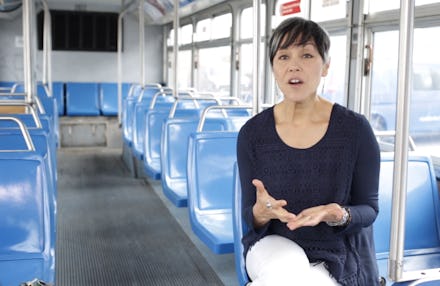One Simple Idea Is Helping Give America's Homeless Their Dignity Back

Apart from the inherent hardships and trauma of living on the streets, one of the biggest practical challenge of homelessness is the lack of access to hygiene facilities. In San Francisco, where close to 6,500 adults and 900 minors were estimated to be homeless people in 2013, the nonprofit Lava Mae is hoping to help give these citizens a simple but effective way to feel human again.
Seizing on the idea that even small things can make a discernible difference, the nonprofit is trying a unique approach — outfitting four donated municipal buses with portable shower and bathroom stalls. Launched last week, the buses, which mean "wash me" in Spanish, are adapted for people with disabilities. Lava Mae estimates that by next year, they'll be able to provide 2,000 showers a week.
Image Credit: Tumblr
"When you're homeless and you're living on the streets, and you're filthy and you're trying to improve your circumstances ... you get disconnected from your sense of humanity," Lava Mae founder Doniece Sandoval, a former marketing executive told the Associated Press. "So a shower, just in and of itself, is amazing."
Inspired by the concept of food trucks, each truck is a mobile bathroom, complete with a showering pod, as well as a toilet, a sink and a space to temporarily store personal belongings. The San Francisco Municipal Transportation Agency donated four decommissioned municipal buses to Lava Mae, allowing the organization to tap into fire hydrants. But Lava Mae had to raise the funds to retrofit the buses, which cost of $75,000 per bus.
That funding comes from a mix of sources. Lava Mae raised $58,000 from an Indiegogo campaign, as well as contributions from individuals and small private family foundations. Sandoval and her husband also put a significant amount of their own money into the project.
Public spaces, architecture and civic laws are growing increasingly hostile to the homeless across the country, as cities grapple with a difficult and persistent problem. However, these crackdowns have also spurred a positive movement of sorts, aiding in a surge in initiatives and volunteer groups who are coming up with creative ways to help people.
In April, New York City nonprofit New York Rescue spearheaded its Make Them Visible campaign, which aimed to help New Yorkers realize how indifferent they had become to the omnipresence of the city's homeless. Meanwhile, in June, Vancouver, British Columbia, charity RainCity debuted innovative, convertible benches designed to provide shelter and sleeping space for the homeless — the exact opposite of the antagonistic "homeless spikes" seen in cities such as London recently.
In Lava Mae's case as Sandoval points out, showers won't end homelessness.
"That's not the point," Sandoval told ThinkProgress. "What we are about is providing hygiene because we believe that hygiene brings dignity and dignity opens up opportunity."
Image Credit: City of San Francisco